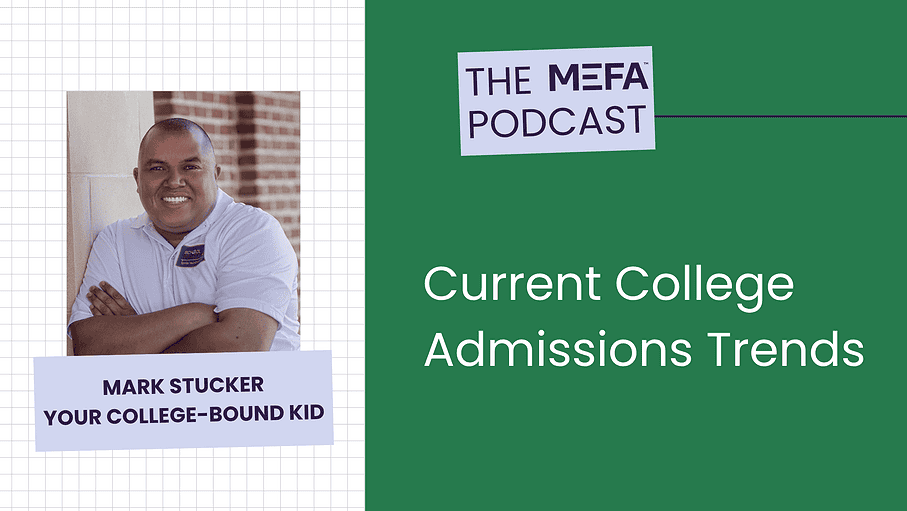Resources Mentioned in this Episode
Please note that this transcript was auto-generated. We apologize for any minor errors in spelling or grammar.
Jonathan Hughes: [00:00:00] What are the most important things that juniors can do between now and the time when they actually send off their applications?
Mark Stucker: I love this question. For one is keep researching your colleges because you know the applications are going to open up in August and you’re not going to know which ones to do if you don’t, if you’re not putting, copious time into researching those colleges.
So the students that I work with, I really like them to have their clouds list down by July 15th. It’s really ideal so that we know which applications to work on. So I would say that’s extremely important. Another thing that’s extremely important is there’s a lot of writing in the application, and you can do a lot of it now.
So there’s the personal statement, the 650 word essay that goes to everybody. February 27th, those prompts came out, so we know what those are. And all of those can be done, and there’s a lot involved in that, right? Because [00:01:00] you’ve got to do brainstorming to come up with your topic and then outlining and then multiple drafts.
And the colleges are looking for a lot in there, but that goes to everybody. That takes the common app, which is over 1100 schools and most of the schools people are interested in. So that’s, this is a great time to do that.
Jonathan Hughes: Hi everyone and welcome to the MEFA Podcast. My name is Jonathan Hughes, and you just heard from our guest on the show today. His name is Mark Stucker. He’s returning to our show to talk about what he talked about two years ago on the show, which is trends in college admissions, and you will love this as much as I did.
Mark is an endlessly knowledgeable and fascinating guy who has worked in higher ed for decades offers admissions counseling and created and hosts his own fantastic podcast called Your College-Bound Kid with his many colleagues. Julie and I have guested on that show and Mark has been on our show, and I always love it when we work [00:02:00] together because he knows just so much about.
College admissions about college fit for students. We are going to talk all about what is happening at the national level, how colleges are using AI to synthesize applications. The rise in direct admissions, that is colleges selecting students versus students selecting colleges, views of colleges and alternative pathways and more.
You’re going to love it and you will come away from this conversation as I did wiser. So I will be back to wrap things up, but first let’s get reacquainted with our guest.
Mark Stucker: Sure, yeah. My name’s Mark Stucker. I’m in my 25 year doing a mixture of both admissions and college counseling. Done it in Texas, Dallas, as well as Pennsylvania as just outside of Philly.
And I’ve been in Atlanta now, this is year 16. And, I’m an author. I wrote a book called 171 Answers to the Most Asked College admissions questions. Have a company called School Match for You where we have [00:03:00] counselors little less than half a dozen counselors, but we are multi counselor practice and we help people with all aspects of the college admission process.
And the way I got to know Jonathan was through a podcast. Started in we’re in year eight, now up to episode 5 24 called Your College-Bound Kid. That’s a way I’ve met some of the most interesting and fascinating people all around the world is through that college admissions podcast.
And we do that every Monday and Thursday. We do a deep dive with an thought leader in the world of college admissions. A lot of, directors of admission, VP of enrollments, directors of financial aid, test prep people. We also just address issues in college in general. And then our listeners can send in questions so we get questions from all over the world that they verbally send in.
Jonathan Hughes: Yeah I love the show. Thank you. I love the show and it’s not just because Julie and I have been guests on it. Yes. It’s really a great show. And we’ll put a link because, you talk about so many fascinating things on the show and have such great [00:04:00] people on. And I’m really, the, your.
College Bound-Kid is a good North star for our show to kind of look to. Thank you. I really love it and I hope you do another 500 episodes.
Mark Stucker: Yeah, that’s the plan. I’ve said you’d have to, I have to be on the deathbed because it’s just become something that brings me tremendous joy and you meet the most interesting people and it’s fun helping people.
Jonathan Hughes: Since we have talked in the past two years what are the emerging trends or anything surprising going on in college admissions?
Mark Stucker: There’s a lot. One of the big things was, the protests on campuses really impacted of impacted college admissions a lot. They’ve, they’ve caused certain families to not look at certain schools that in the past have looked at certain schools.
One of the things that’s really current source of a lot of debate consternation is the strength of the anti DEI movement that’s [00:05:00] certainly prevalent, hitting colleges really hard and trying to scramble to figure out what to do with it. Another one is the real movement to the south.
It’s been a very noticeable trend. I’m not talking about migrating patterns, although that’s happening as well from people moving, leaving the Midwest, leaving the northeast, heading to the southeast and southwest. That’s been happening, but I’m talking about the growth of applications to colleges in the South.
I was just at the SACAC conference, which is. A regional conference of over a thousand people, admission officers, college counselors, all get together. And it was so many workshops and things were on this. And so there’s a lot of reasons for that. We’ve done several deep dives with interviews and experts on our podcast, but some of it is weather, some of it is football, fraternities, and fun.
Some of it is people feel schools in the northeast have more liberal indoctrination in their. That really started during covid. A lot of that, and that’s just gained [00:06:00] momentum. Some of it is less anxiety over college. People are saying, why am I fighting to get in a place with, it’s taking one in 20 kids?
Let me go somewhere with a softer admit rate. Some of it’s the cost of college. Like people, schools are literally hitting the a hundred thousand dollars price point. Some of these private schools now cost of attendance and in the south people are seeing lower sticker prices and more merit scholarships.
And then the population migration role plays a little bit as well. I had a family tell me private counseling, I only want my kid to look at schools that are in growing areas because that’s where the jobs are going to be. So that’s a major trend. And there’s. Ma many others I, I can see by our pre-meeting that will, I think your questions will prompt me to discuss some of the other things as well.
Jonathan Hughes: Yeah. And the two of them that I mentioned in in the questions that I prepared, which I assume you’re referring to is two of the things we talked about last time when you were on the show, the Supreme Court decision at the time, it was the upcoming Supreme Court decision on affirmative action and also ai.
College applications and [00:07:00] college essays. So I wonder if you have anything to say about those particular topics.
Mark Stucker: Sure. Both of them are really complex. The answer I would’ve given six months ago may almost be different than I would now in the Supreme Court. So I give both.
So last year, colleges were all over the place. I would talk to a school and they’d say, we’re not even touching race. We’re not, it doesn’t come up in committee. We’re not going anywhere near that. We’re not getting a lawsuit slapped on us. So I would hear that perspective. Then I would hear other schools who would say things like, we’ve really done a deep dive and we’ve looked at this and our general counsel has looked at this, and we think that.
Decision does not really pertain to recruitment. It doesn’t pertain to evaluation and it doesn’t impact yield. So we still feel a lot of license to do things to shape our class in ways that we feel would be most beneficial to our student body. I talked to [00:08:00] another senior leader at another school who said that Roberts, a lot of people have told me this, Roberts ended up, I’m talking about Chief Roberts ended up saying, differentiating between.
People that check a box versus people that are able to explain how their life has been shaped in some way by their race. And when someone can point out how race has had an impact on shaping who they are today, then that can be considered. So a lot of people have pointed to that and one, one school said to me, we were never going by box checking anyway, business as usual. There’s no change at all. There’s nothing that was said that was any different than what we were doing already. So that’s, those are like the, the sort of the two extremes. And then you have a lot of people who are in between who are just maybe being still believe in to the core of their mission that.
A di a diverse student body where you bring together people of all different walks in life. That’s what leads to the best education. Preparing people to be [00:09:00] critical thinkers and to go out into a world that’s diverse. So course colleges believe that to their core. Some of they’re just a little more covert with how they clandestine, maybe with how they implemented that.
But then the recent thing that’s happened with removal of multimillion dollars of grants. We’re talking hundreds of millions of dollars in grants that they’re being told they’re going to lose. So what that is causing some schools to do is to say, we can’t afford to take that kind of a hit. So we need to stay out the cross hairs.
So this is a massive debate that’s happening. We’ve got a. A good interview up on our podcast right now. Our website, your co brother kid.com. We post all our interviews. It’s with Andy Strickler, who’s the Chief Enrollment Officer at Connecticut College. He goes into this in some depth and just the struggle that this is producing because you literally have your mission of your institution being paired against your own financial health and.[00:10:00]
Where people come down on that is slightly different. But at the end of the day, people feel like if we don’t have our financial health, we don’t even have our institution. So it’s causing a lot of schools to make decisions that they really don’t agree with, but they don’t feel they have any other choice.
Jonathan Hughes: And so has your counseling on this changed as you say? You have a different answer now than you would six months. Sure. Has. Has the counseling on that changed in that time?
Mark Stucker: It’s a great question. The problem is so much is in flux, it’s hard to know what to do and, certainly it depends a little bit on who’s asking it and how sensitive they are and just what their expectations are, because at the end of day you’re trying to match people up with schools that meet their needs and depending on the perspective and the expectations of what the person asking is asking, then the answer may change. But, and some of it is also school by school too. because I’m trying to follow individually what schools are doing [00:11:00] in response to this.
It’s a little bit easier for me to follow that on from an admission standpoint because a lot of times they’ll tell me that and I, when I talk to them, but it’s still ever in flux. And then the other thing you asked about is the same thing. AI, Yeah. AI is all over the place like. I have an interview tomorrow with a college over how they use, how they’re using AI in their admission process.
But, and then Slate, which is the main CRM that colleges use now over 1900 colleges use. They’ve got some AI built into it. There was a lot of debate. A article emerged over University of North Carolina Chapel Hill, where my youngest daughter works. Over how they were using AI to do some assessment of the writing level of students.
But then you’ll have a lot of colleges that will push back and say, no, we’re not doing any of that. And then a lot of people are experimenting with it. I was just at that, sat [00:12:00] at conference last week and there was a lot of conversation about this. Some of the admission officers said, listen, people do not want to feel like robots are making decisions.
So for that reason alone, we wouldn’t do it. But also, if it’s a school that’s doing holistic admissions, they’re going to believe that at their core there’s things that just can’t get captured by machine learning. And there’s always going to be a need to individually put things into context, an example that was used was.
You’re looking at someone that has four schools in four years, and you might think, gee, this person, four high schools, you might think this, student seems a little unstable. What’s going on here? Why the bouncing around all the time, but then you found out the dad was incarcerated and they were living from home to home and now you don’t want to ding the student over.
It wasn’t, didn’t have anything to do with them quitting. There’s going to be a lot of complexities like that. AI’s just not going to be able to capture that for people that are truly doing holistic admissions, which is what most selective schools are doing. Which is another [00:13:00] way of saying whole person admissions, which is another way of just saying, taking the context of the individual into consideration when you evaluate them.
And AI can’t do that now a lot. There’s also a lot of confusion because. People are almost using the term AI for everything. And a lot of what AI may be doing is like helping schools, like with sorting of applications and make that more efficient. And what sometimes schools hire people called pre-reads to figure out transcripts and a, I see a lot more AI being used.
Those kinds of things to increase efficiency. But then is that even AI I’ve had an expert on that said, that’s not AI. Everybody’s calling that AI. That’s not AI.
But a lot of times when people ask the question, they’re really asking are humans or robots making decisions? And I really don’t see that, robots or artificial intelligence are making the actual [00:14:00] decisions.
I do think more and more colleges are talking about how can we use, artificial intelligence to make us more efficient in managing an ever-growing caseload at some places. But it really has to do more with file organization and initial stuff that really wouldn’t boil down to the actual decision making.
That’s what I’m hearing so far. I’m not hearing people outsourcing the actual decisions to AI. Certainly for not anybody that’s doing holistic admissions.
Jonathan Hughes: When we talked about it two years ago, we were talking about it almost exclusively in the domain of the college essay and students using the col ai to write the college essay.
I don’t know if there’s been any movement on that or if that’s something that you see from students that you counsel at all.
Mark Stucker: Yeah, so there’s definitely been some movement on that and some of it’s all over the place [00:15:00] because a lot of people are using software detectors and things like that, but then those things are very prone to make errors.
Duke, I had Duke on the podcast and they made a big announcement that they are no longer. Giving a score to somebody’s form on their writing. So there’s always reading of the essays for content, and then there’s reading to see how good of a writer you are. And they explained it.
Part of it is ai, but part of it is so many people have either outside professional help or individual letters, English teacher, someone like that. So they don’t really feel they can trust that what they’re getting is student work. But part of that was motivated by ai. One of the things I feel I’ve seen a change on that a little bit is there’s more of a mindset that there may be a purpose for AI may serve a purpose in helping you brainstorm and that may be legitimate.
Yeah. And let’s not just throw the whole thing out and say bad idea. And a lot of times the example that you’ll hear people use is the calculator. [00:16:00] When the calculator first came in, there was like tremendous backlash against it. Is something that, oh my goodness, this is corrupting education, but people have come to embrace it.
So I feel like there’s been more receptivity for, there’s a place for AI if you use it in your brainstorming, as long as the work you’re actually producing is your own work.
Jonathan Hughes: Duke, I’m just interested in this. They’re moving, it’s solely on content now, correct?
Mark Stucker: Correct. So the evaluation is all done, like the personal qualities that they learn about that the student has and the passions and interests.
Those are all fair game. And they’re up for evaluation, and that’s so much of the writing anyway. But whether you put two sentences together well. That piece. There’s just not part of their writing evaluation. Now it’s more about what do I learn about who you are as a person, how you’ve changed, how you’ve grown, how you see the world, or also what your understanding is of our institution and why you feel you’re a good fit and good match for our institution.
All that stuff is legitimate fair game, but just [00:17:00] not trusting the fact that. Other people haven’t been involved in making sure that the sentence structure and that is what it is. So it’s just too many people we know are having assistance, whether it’s human or AI for us to feel that we can give a rating to that.
Jonathan Hughes: Another topic that we talked about a few years ago that I think there’s been more discussion about since that time, is the value of a college education. So with a lot of surveys showing that people might be questioning whether or not college is worth it for a lot of different reasons, and you talked about some of those ideas in, I think the answer to the first question of the trends.
Have you seen, I guess you have, seen those conversations continue and that, I don’t wanna say skepticism, but that debate continue. And have you talked to folks out there, and I know you’re a college coach, but have you talked to families who are considering different approaches if it’s not college or have you talked to other [00:18:00] organizations that are seeing families do that?
Mark Stucker: Yes, definitely. And this is definitely on the rise. In fact one of the very recent interviews I had on our podcast is, which Kathleen de Lasky and the name of her new book is Who Needs College Anymore Matching A Future, basically where degrees are optional. Now it’s not an Antico book.
She runs a Think Tight Tank Educational Design Lab. Yeah. And you’re just looking at the fact that college isn’t working for so many people like, like it’s only about a third of the population that have degrees, so it’s not working for so many others. So what can be done? And there’s a lot of creativity in that space right now and a lot of momentum in that space.
So you’re seeing all kinds of things from things that, you know, not things that are new, but I’d say things that are growing, growth of badges and certificates, colleges offering more of those themselves. Growth of online [00:19:00] growth of hybrid programs growth of combo programs like co-ops and internships and combination of like on the job training mixed with education.
And then you’ve also seen, like for example, when Governor Shapiro took over in Pennsylvania, he took a whole bunch of government jobs that used to require degrees and said they don’t need degrees anymore. There’s been a trend in that direction. Now most parents who are college graduates are still want their kid to go to college, partly because they had a great experience.
They feel like it has helped them in the job market as well. And. And even a lot of the people that say we need to provide alternative pathways for those for whom college isn’t working still acknowledge that college is a great path for a lot of people. And some people have been very outspoken and said that, some of those jobs are entry level jobs or you don’t need college.
But then if you look at, the higher level jobs, oftentimes you do need college. So [00:20:00] I still think there’s gonna be a great demand for college, but. The finances are under assault because there definitely is a backlash where it is perceived as liberal indoctrination. And I was talking to a college that’s a very conservative college, and they said they have never seen, so few male applicants.
And this is actually a school that’s experiencing a lot of growth. Yeah. And so that’s, that trend has been going on for a while, right? More females applying than males. But part of this multi-college liberal indoctrination movement that is much more prevalent in male circles. So that’s widening the gender divide as well.
Jonathan Hughes: That was my, question is. Is, the two reasons that I think of for that are, cultural or political reason. And, but that’s a distant second in my mind to the first being the cost. And maybe that’s just why, [00:21:00] maybe that’s just because, the cost of college is what we do at MEFA.
Mark Stucker: But I find a lot of times with cost, it just leads people to other alternatives normally. Kind of what I was talking about, the. Then move to the south or I’ll stay, I’ll do public, not private or I’ll do community college or I’ll stay home. And instead of doing residential, like a lot of times the cost isn’t necessarily no college, it’s just doing college cheaper. But one of the other reasons is just I don’t want to go and I don’t feel I need to go.
And a lot of times people feel like other alternatives are either a quicker way to make money sooner, or they’ll. Or they, they just don’t need it. You’ve heard the growth of sort of the whole internet influencer and all of that, but that is very real. Like people, there’s so many people on social media that I didn’t go to college and look what I did.
And so I would say another reason is there’s a sizable number of people that just don’t feel they’ll get their return on [00:22:00] investment. It’s just not necessary to have a viable career path. Career pathway. Which is a slightly different issue than just the cost. Cost is, oh, it’s too expensive.
Yeah. This is, I don’t really think I need it to make a good living doing what I want to do. So I would say that would, that’s a third reason.
Jonathan Hughes: And do you think that idea of the college premium, so to speak, is still a valuable idea?
Mark Stucker: Sure. Because I. Like so many people will say, college was transformational in my life. Like from whether it’s who I met to how it changed my thinking or developed my critical thinking or developed my level of learning to the skillset, acquisition and the job path. And I wouldn’t have the job I have today if I didn’t go that way. And then there’s just so many parents that had the experience that are sold on it that they.
They still want it for their students. It’s just that before it was almost, it was unquestioned. It was like, this is just what you have to do and whatever [00:23:00] price you have to pay, you just have to pay that price because it’s just what you have to do. And that is what is no longer just assumed as a given.
And it’s impacting colleges too, because they are having to beef up their career centers, constantly show their ROI, liberal arts and science schools are having to implement professional programs that the public does see as valuable and be conscious of bringing in programs that have higher starting salaries if they’re not offering them.
So you’re seeing how the schools are making adjustments to, to satisfy a skeptical public.
Jonathan Hughes: Yeah. One of the ways that, I wanted to ask you about that. Colleges are making adjustments, I think, to this is direct admissions and so that’s something that I think has again, blew up a little bit since we talked a few years ago, is the growth and direct admissions.
Can you just tell folks really briefly what direct admissions is, and [00:24:00] if families did get a notice from a college, a direct admissions notice, how should they think about that and what should they know?
Mark Stucker: Yeah, no, this is absolutely one of the major trends. So when you think of traditional admissions, you think of completing an application, sending the application to a school, usually paying a fee, and you can get admitted, or you could be denied or deferred or waitlisted.
I like the term that EAB uses. For direct admissions, they oftentimes call it flipped admissions because it flips admissions upside down with direct admission. You go on and you complete a bunch of information in some type of portal and then there’s no actual applying. Colleges have access to that portal and you just find out if you’re admitted or not admitted, and you find out if you’re admitted with scholarship money.
So there’s no rejecting going on. There’s no submitting of [00:25:00] application fees. There’s less work. And it’s growing very rapidly. Jenny Rickard, who’s fantastic, and she’s the CEO of the Common app. She’s pushing this really hard common app, has a fantastic product niche, has a product that’s growing really quickly, and every year, more and more schools are at it.
Then you have state partnerships spring up all over the place that have their own direct admit path. Connecticut Automatic Admissions program is one. Illinois OneClick College Admit Direct Program. And there’s a lot of these. There’s more than a dozen of them. And then College Board is now unleashing their own direct admit program, starting with this year’s class.
I mentioned EAB. They have their own program. Angel Perez who is, CEO of NACAC, he said at the national conference in 2022 in Houston. He wouldn’t be surprised in 10 years. If direct admission is the main way admissions is done in this country. And at the time I thought, wow, that’s an, that’s embellishment.
And I don’t necessarily disagree with him anymore. The only thing that I will say [00:26:00] is it’s very appealing to less selective and moderately selective schools, the most selective schools. Have not so far embraced it because one, they like their own system that they’ve devised, but they feel they want very individual, customized information for their school and they feel it’s too generic.
So I think it’s going to be a while before you see the most elective schools get on board. But what I think’s going to happen over time’s kind of a compromise and the meeting in the middle is going to happen. So the portals are going to get, gather more and more information so that colleges. It can feel like, you know what?
I am getting enough information from them, to make a decision. And then I, and then the colleges, as they see direct admission grow, they’re going to want a slice of access to that, to that applicant pool. But it can be very appealing because one of the stressful things in the admission process is in the back of people’s mind is.
Sort of that doubt [00:27:00] looming and lingering. Am I not, am I going to get in anywhere? Yeah. And so when people go in, they do a portal and the next thing you know, they get a bunch of admission offers with scholarships. I’ll tell you what, I’ve really seen this. It’s a real confidence booster for kids and it really takes a lot of stress out of them.
So it’s definitely a trend worth following and one that shows no signs of letting up.
Jonathan Hughes: Yeah. To bring it back to the selectivity component to this, one of the things that, that we talk a lot about at MEFA, and I know you talk a lot about on your show, because I’m thinking about a couple of episodes of your show is Fit, right.
So what fit. Is right for a student between a student and a college. So there’s academic fit, there’s financial fit I’m thinking about some of the episodes that I’ve heard on your college bound kid. What are some other ways that students should think about whether or not this college that they’ve been admitted to is a good fit for them?
And [00:28:00] so how can they determine that during the search process?
Mark Stucker: It’s a great question, and I’d say one of the most important ones is social fit. That’s extremely important. I attended, once again, that was fleshing my mind because I just got back from sac, but I attended a lot of workshops there and I attended when it was put on by former admission director at Tulane.
It was quite good. And this was all college admissions people, I think it was the only college counselor in there. But you started out by going around and asking people what’s the most important thing to students? And somebody bounced, somebody, one person said connectedness or belonging. And then somebody else, somebody else said.
That they see people like themself there. And then, and they basically proceeded to say, both of you are really close. All of our research shows, you can summarize it in one word, vibe is the vibe, what they’re looking for. And really they’re really talking about a combination of a couple things, but a lot of it is.
Am I going to be, how are people going to like me? Am I going to like [00:29:00] them? Am I going to find my type of kid and do I feel comfortable? Can I see myself there? And the best way to do that is to visit a school and to talk to a lot of students. That’s that single best way to do it. Trust your instincts on a visit, you’ll get a feel and talk to a lot of students and ask them the tough questions.
I, I like to tell our students, I, and this is what I do I’m about to do a 26 day trip to Texas. And I’ll be visiting a bunch of colleges one a day, and I sit foot on campus and I, I plunk myself down there for three and a half hours. And I talk to kids and I have my questions. I like to ask them.
I start, I ask, I like, my favorite question for opening is, tell me what you think are the best things about this institution. So then they talk, and then I go in the opposite direction. I say, if you could change anything and you were in charge, what would you change? And then I say, what did you not know until you got here?
And then I say, what kind of student like really does well here and what kind of student, really doesn’t, and you start, you ask enough people, those kinds of questions, you get a real good sense. But the problem is. That, [00:30:00] that type of visit is very resource intensive, right? It takes time and money, and then a lot of introverts aren’t uncomfortable having those conversations as well.
So school newspapers are great. Almost all of them have back copies and you can go and read them on their websites because they’re never intended to be for prospective students. So you’ll find out what the hot topics are, and especially if you read like letters to the editor and you can really get a sense of.
What’s swirling around campus and where the buzz is. And then some of the social media sites are quite good, like Zeemee, such just social media put on by college campuses where a bunch of students all interested in the same school get together and chat. Those can be really good.
Jonathan Hughes: Oh, what is it?
Mark Stucker: Zeemee, Z-E-E-M-E-E. Yeah. We’ve had them on our podcast twice. They’re quite a good way to get a feel for the culture. Oh, all right. And reading reviews. I once had a parent from Denver. I was working with and she asked me about a student for her daughter, and she said, on the one hand, [00:31:00] it seems like, and she said all these positives, but she said on the other hand that she shared all these negatives and she’s I’m trying to figure out which one is true.
Now it’s a school. I knew really well, but I was like, just mesmerized that she had all of these insights. And so I was like, how do you know all these things? Because kind of everything that she was saying from my perspective was true. And she was like I read a couple hundred reviews. Wow. So you can just go to websites like Niche and Unico and many others and you can literally read hundreds of reviews.
And I encourage people to look at the stuff that gets, just keeps getting repeated over and over again. But social fit is certainly a really important, component of fit. It’s very important that people can see themselves there. It can be a home away from home that my type of kid is there, that they feel like it’s their type of community.
So that’s a really important fit. You had mentioned academic fit before and financial fit as a couple others, the career fit [00:32:00] is important to people as well. What did they envision themselves doing? If they’re, if they know that, and then, what is the, what does the research show people that graduate and maybe what you’re thinking about graduating and what type of opportunities.
Do they avail themselves of, and that’s why I think the career center is really one of the most underutilized resources when people are researching schools, as is the Department of Institutional Research, which has a lot of really great information as well. Those are a couple other, components of fit besides, besides financial fit and of course academic fit has all kinds of.
Aspects to how you would break that down as well. From teaching style to, to size to curriculum, to, we could go on and on with all of, all that’s involved in that experiential learning opportunities for research and travel abroad and, learn by doing and there’s just a lot of components that are involved in that piece.
So we are recording this in April at a time when [00:33:00] seniors are getting their admissions decisions and their financial aid offers. But if we could just think about juniors, I. Or maybe even folks you know in earlier grades than that, but anyone who’s just starting their college search process or maybe their application process.
Jonathan Hughes: Let’s go back to juniors. What are the most important things that juniors can do between now and the time when they actually send off their applications?
Mark Stucker: I love this question. For one is keep researching your colleges because. The applications are going to open up in August and you’re not going to know which ones to do if you don’t, if you’re not putting, copious time into researching those colleges.
So the students that I work with, I really like them to have their college list down by July 15th. It’s really ideal so that we know which applications to work on. So I would say that’s extremely important. Another thing that’s extremely important is there’s a lot of writing in the application.
And you can do a lot of it now. So there’s the personal statement, the 650 word essay that goes to everybody. February 27th, those prompts [00:34:00] came out so we know what those are, and all of those can be done. And there’s a lot involved in that, right? Because you’ve got a. To brainstorming to come up with your topic and then outlining and then multiple drafts.
And the colleges are looking for a lot in there, but that goes to everybody. That takes the common app, which is over 1100 schools and most of the schools people are interested in. So that’s, this is a great time to do that. And a lot of times I’ll have students do that, like February, March before piece.
Then APs, if they have APs, they’re going into kind of heavy, steady season. But then as soon as they get through that and school starts slowing down, it’s a great time. The students will do it as well, may. It’s a great May, June project is to get that done. But then there’s other writing in the file like there’s an additional information section.
It’s just been changed from 650 words to 300 words that can be written now. There’s a brand new challenges and circumstances essay that just came out. It’s a 250 worder. Get that done. Because what happens is the individual custom prompts, the school specific [00:35:00] essays, they don’t become available till the common app comes out, which is August one.
Some schools release them earlier, but most don’t. And once they come out, there is so much work involved in that, especially, it does depend a lot on how many schools you’re applying to and which schools. But some schools have a few schools have a half a dozen of these. So I want people to get all the writing done so that when the schools release their own individual application, you can just focus on those custom prompts, you might know that you’re applying to those honors College, it may be an honors college essay that has to be done. So the writing is incredibly time consuming, and it’s a great time to get it done. I’m trying to avoid students doing all this in the fall of their senior year, because that’s like adding two classes to your schedule and.
If you’re applying to selective schools, it’s an expectation that your senior year is your most rigorous, so you’re already dealing with hard classes. You don’t want to layer that with all of this work, that you already know what it is, why not get it done. Then there’s other things like you’re going to have to present your activities and they [00:36:00] need to present it, be presented in the order of importance, and you only have 150 characters, so you have to think long and hard about how you’re going to describe what you did, you have to do that.
That can get done if people aren’t. Aren’t if they’re submitting test scores and they’re not happy with where their test scores are. SAT prep certainly, is something that can get done. Now, summer planning and then, you need to be asking your teachers for recommendations.
Now, like I’d say at least every other year, somebody will say to me, I asked the teacher and they said. I do 15 a year and I’ve already committed. I’m sorry, I wish you would’ve asked me earlier. So securing the commitments from your teachers that’s another thing, that can get done.
Some schools are going to ask for a resume, some don’t. But for those who need that, you can go ahead and do that. Then there’s planning of visits, working the visit calendar and planning the visiting. And a lot of times it’s a parent job, but. So those are all things that, juniors can be doing now and should be doing now.[00:37:00]
Jonathan Hughes: Is there anything else that I haven’t asked you about that you would like to talk about?
Mark Stucker: No, I think this is great. I think you covered a lot of things. The biggest thing that I would say is knowledge is power and there’s so much in flux make it a point to stay apprised of what’s going on.
I can’t. Talk enough about the importance of fit and match. A company’s called School Match for you for a reason. My, probably my favorite example in talking about the college process is putting on a pair of shoes. Someone could go get a thousand dollars pair of shoes and everybody’s oohing and aing.
They’ve got the, this rare brand of Air Jordans or whatever. But what good is it if you get plantar fasciitis, corns bunions and ingrown toenail, it doesn’t do you any good. But I see too many people are picking colleges because they’re trying to curry the favor and impress their friends, their, peers and parents as opposed to really thinking through.
What does it fit and what does it match for me? Too many people are relying [00:38:00] on external rankings but it’s impossible for a ranking, which is formula driven to totally line up with your value system. And people are relying on these things and the ranking’s not going to tell you anything about whether you like the students there.
The school is strong. And your program, I’m talking about the overall composite rankings, whether it’s strong in your program, if you like the location, you like the size, you like the distance from home, you like the composition of the student body, you like the culture. All kinds of other things.
So don’t rely on those things and stop. It’s easier said than done because one thing I remember in college, I remember taking a sociology class and learning about George Herbert Cooley’s looking glass self, right? You look at everybody, especially significant people around you, they’re like a mirror and they reflect back to you what they think about you, and that becomes part of how you see yourself.
Especially if you’re in upper middle class circles, there can be a lot of pressure, and especially in some states, including Massachusetts, that’s a big pressure filled state. I find, especially in the Boston [00:39:00] area, there’s tremendous pressure that students feel to go to a college that gains them respect, and that’s parents and peers both feel that.
And, I really want to encourage people to not make their decisions based on what they think is impressing peer people in their peer group, but really go through a process of getting to know yourself and ignoring their rankings, ignoring all these external things, and really think through what’s going to work for you.
I don’t want students to be like the student that contacted me a couple years ago and absolutely hated his school. The parents asked me if I could work with him on a transfer school, and he, it was so negative. That at one point I had to say, you really don’t like this place. Can I ask you why you chose it?
And he said it had an 8% at mid rate. How could I turn that down? So that’s what can happen if somebody doesn’t go through the process of discerning fit and match and they just pick [00:40:00] something based off of prestige or rankings or what they think will impress peers or parents. And it can lead to, some very.
Deleterious effects that I don’t think anybody wants for their, for themselves or their kid.
Jonathan Hughes: I think that’s great advice and it’s, I think it’s a great place to, to end on. So I want to thank you again, mark, for being here. It was a pleasure as always.
Mark Stucker: Oh, lot of fun. Thanks for having me on. Hopefully we gave you list of some nuggets to chew on.
Jonathan Hughes: All right. Didn’t I tell you that was a good one, mark. Thank you again for stopping by and sharing what you know with us. And folks, if you like what you heard on the show today and you want to hear more from us about planning, saving, and paying for college and career readiness, then please follow the show.
And you can do that wherever you find your podcast. And please remember to review us. It helps us to keep doing [00:41:00] what we’re doing and getting this show out to folks like you. I would like to thank our producer, Shaun Connolly. I would like to thank Meredith Clement, AJ Yee, Lisa Rooney, Lauren Danz and Christina Davidson, their assistance in getting the show posted.
Once again, my name is Jonathan Hughes, and this has been. The MEFA Podcast. Thanks.












